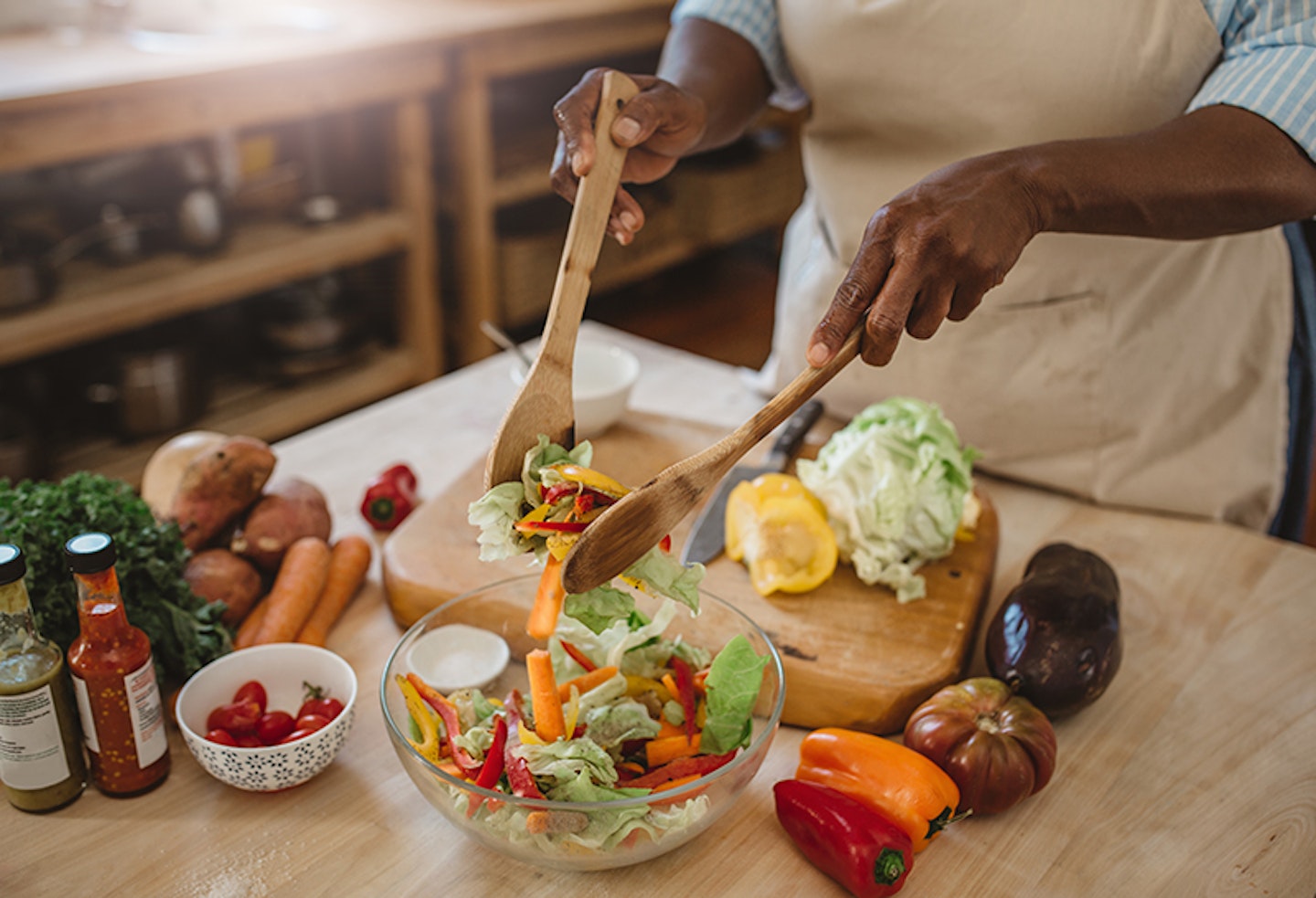With the challenging backdrop of Covid-19, supercharging our immune system has never been more important. If you're wondering how you can boost your immune system naturally, read on for our tips and advice on simple lifestyle changes that will make your body healthier and better at fighting infection.
There are lots of things to love about autumn, but more time indoors, stodgy comfort food, or letting our exercise routines slide a little bit can make us more prone to colds and other bugs.
Our immune systems act to defend out body and fight off the pathogens which cause illness. But our immune response capability naturally reduces as we age, making it more important than ever to help it run smoothly, therefore a more holistic approach is required to maintain it.
But it doesn’t have to be anything drastic. Just making little tweaks and building new daily heathy habits can have great effects, as well as reducing your chances of winter illness you may find it easier to slim down, feel more energetic, sleep better and generally feel healthier and stronger all round.
Here are our top tips to help us all feel well and ready to fight off anything that comes our way in the colder months ahead.
How to ‘boost’ your immune system to fight coronavirus
Philip Calder BSc (Hons), Professor of Nutritional Immunology at Southampton University says, "Two of the most important cells in your immune system are called natural killer cells and cytotoxic T-cells - both have the ability to destroy cells which are harbouring viruses.
"Some people use the term boosting the immune system, but I prefer the term 'supporting' the immune system. Because we understand how the immune system works and what effects its functionality, we can improve the immune response through particular lifestyle changes to ensure it is working efficiently to fight viruses and bacteria the way it should."
Minimise stress
Stress can suppress the immune system and make you more vulnerable to infection. Chronic stress (that lasts from weeks to years) may also interfere with the infection-fighting ability of your white blood cells, making you more susceptible to contracting illness. You can help minimise stress through regular breathing techniques and meditation, reading books or by simply sitting down and having a tea break.
The benefits of getting outside

Spending time outside in green space has well-known physical and mental health benefits. Scientists have spent years trying to work out exactly what’s going on in our bodies when we step outside, and some have concluded that nature can enhance the functioning of our immune systems. Even if the weather is a bit miserable, getting outside for just a few minutes each day this winter could help you stay well.
Stay active
In order to stay healthy, it's important to make sure you’re active on a regular basis. This is because exercise can help support good circulation, allowing our white blood cells to travel through the body more effectively. Make sure to keep it moderate though, as excessive, overly intense exercise can sometimes do our cells more harm than good.
Lacking motivation to keep moving? Keep these scientific reasons in mind:
- Regular exercise is one of the best ways to keep your body functioning well – and the good news is, the results start immediately. Studies have found that in the short term, exercise can help your immune system deal with bacteria or viruses, while long term it will protect it against the changes that accompany ageing. Aim for 150 minutes of movement per week.
- Be sure to include some weighted workouts, whether using physical weights (carrying shopping bags or lifting tins of beans repeatedly also counts) or bodyweight exercises such as push-ups, planks and squats. Increased muscle mass has been linked to stronger all-round immunity, including a reduced risk of cancer or dangerous infections.
Take on the challenge: Since being outside and exercise is so great for boosting your immune response, how about setting yourself the challenge of Walk1000Miles. Run by our friends at Country Walking magazine, it's a great way to get out and about in the countryside, make friends, lose weight and most of all have fun!
Sleep well

When we are feeling tired and run down, our body is less able to fight off infection. The body repairs itself when we’re asleep, which is why is it so important to make sure you get plenty of sleep. Aim for a full eight hours of sleep to be at your best. But if your sleep schedule won’t allow for this, try and aim to get in two 30-minute naps during the day, or at the very least, one 20-minute nap in the afternoon.
Sleep is often mentioned in connection with a healthy immune system, and a new study has revealed exactly why it helps. American researchers found that sleeping allows your immune system a chance to regroup at a time when your risk of getting infected is relatively low.
Struggling to sleep enough? Try the following:
“Adding a cup of Epsom salts to your evening bath can prime your body for well-rested sleep. Not to mention that from an immunity point of view, when magnesium is absorbed through the skin your body works faster to produce serotonin, in effect soothing anxiety and stress taken on throughout the day,” says Stephen Jones, CEO of Nourish Fit Food.
Had a bad nights sleep? A short nap has been shown to help prop up your immune system, as well as lowering stress. Just half an hour’s rest will do the trick.
Limit alcohol consumption
The next time you’re tempted to pour yourself another tipple, consider this: alcohol affects your gut health by damaging the microbiome and disrupting communication between your gut and the wider immune system. Not to mention alcohol causes dehydration, which is thought to weaken your immune system. Stick to soft drinks where possible and aim to drink at least two litres of water per day.
Eat well

There seems to be some sense behind the phrase ‘an apple a day keeps the doctor away’. “Oats, fruit – including apples – veggies, and nuts all contain large amounts of soluble fibre, which aids in reducing inflammation throughout the body to strengthen the immune system,” says nutritionist Kim Bowman.
“Soluble fibre increases the production of interleukin-4, an anti-inflammatory protein responsible for immune support.”
Fruit and veg also contain antioxidants that the body needs to fight oxidative stress.
Those of the orange and yellow variety – including sweet potatoes, butternut squash and beetroot – are rich in beta-carotene, which our bodies convert to Vitamin A. This helps to keep the mucosal linings in our nose and lungs robust enough to defend against infection.
Vitamin D is also essential for a healthy functioning immune system as it is believed to stimulate the production of peptide – substances in the body that are able to fight off bacteria, fungi and viruses. Look to include eggs and fatty fish in your diet – but you may also wish to take additional supplements during the winter.
Lower your salt
Excess salt is bad not only for your blood pressure, but for your ability to fight infection, too.
A German study found people who ate an additional 6g of salt per day (the amount found in two fast-food meals) were left with immune deficiencies.
Drink more milk

According to the NHS, drinking more milk and eating dairy products – such as cheese, yoghurt and fromage frais – can help to support your immune system. This is because they are all are great sources of protein, Vitamins A and B12 and calcium. They recommend opting for semi-skimmed, 1 per cent milk or skimmed milk (as opposed to full-fat milk) and low-fat plain yoghurts.
Keep hydrated
We often associate dehydration with hot weather, however it’s just as important to maintain your hydration levels during the colder months,” says Clarissa Lenherr, a nutritionist at Bioniq. “Staying hydrated supports your body’s ability to eliminate toxins, which is vital for a strong immune system. Aim for 1.5-2l of water every day and if you are craving something warm, reach for herbal teas such as lemon and ginger, which can also reduce inflammation that causes cold symptoms.”
Be good to your gut
The gut and your immune system have evolved to support each other to fight off unwanted pathogens. 70 to 80 per cent of all your body’s immune cells are found in the gut – so it’s essential to keep it as strong and healthy as possible. To give it a helping hand, try taking probioticsor eating pulses, fibre and lots of fermented foods, like kefir, sauerkraut (raw fermented cabbage) and pickles.
“Many people aren’t aware that up to 70 per cent of our immune cells are located in the gut and that our gut bacteria play an essential role in supporting a strong immune system,” says Natalie Lamb, a nutritional therapist for Bio-Kult. Give it some love by swapping fizzy drinks for kombucha – a naturally low-sugar fermented drink that’s packed with live cultures.
